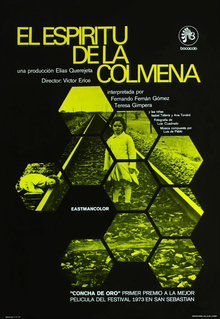We’re no strangers to films that are heavy on symbolism but there’s just too much in this one that we can’t decipher. Victor Erice isn’t a director we’ve seen before and this seems to be pretty much his only film of note. The fact that this is considered one of the masterpieces of Spanish cinema was enough to get it added onto my watch list but even knowing that this was made during a time of heavy censorship in Francoist Spain wasn’t enough to make much sense of it. The individual scenes are mesmerizing and I can see how there is so much intentionality behind them. Yet without the necessary cultural references, I’m reduced to making only the vaguest of guesses as to what it is trying to say and that’s no fun at all.
In 1940, Ana is a little girl who lives with her elder sister Isabel and her parents Fernando and Teresa in an isolated village in Spain. One day the children in the village are excited when the travelling cinema truck arrives. The film being shown is Frankenstein and Ana is enthralled along with the others but doesn’t fully understand the story. Isabel misleads her by saying that the monster is like a spirit and there is one who haunts an abandoned shed nearby. Fernando has a day job that isn’t specified but also spends time tending to beehives and teaches his daughters how to gather mushrooms and avoid the poisonous ones. Teresa loves the two girls but seems to be emotionally distant from her husband and appears to be pining for some distant lover. Ana occasionally visits the shed in the hopes of encountering the spirit and one day finds a wounded soldier who is hiding from the authorities. She offers him an apple and tries to help him.
With each scene feeling disconnected from the others and not much in the way of a main plot, this definitely counts as an arthouse film that is difficult to parse. This seems to have been by design in order to slip the film past the censors of the period. It is beautifully made and presents a magical look into the inner life of a child. We can see Ana’s joy and enthusiasm as the children welcome the arrival of the mobile cinema or even attend lessons at school. There’s also the hurt and confusion when she realizes that Isabel is pranking her, sometimes very maliciously, or when the fleeing soldier is found. There’s nothing in here about the historical background of the society Ana lives in, so it’s up to the audience to infer from the context that the soldier is probably from the losing Republican side during the Spanish Civil War, that her mother Teresa has a secret lover who is likely also a soldier, that her father Fernando is probably connected to the government in some manner and so on. That’s a lot of guessing and without the appropriate cultural references, who knows how far off the mark I am.
You need to do even more guessing to make sense of all the symbolism. What is the spirit of the beehive? Fernando keeps bees and even has a hive in the house itself. He writes about the machinery of bee society in his personal journal and the house features decorations with a hive-like motif. Bees usually represent industriousness but here it seems more likely to be an allusion to the orderly police-state of Francoist Spain in which everyone knows their place. Other striking imagery include Isabel hurting a cat and smearing blood over her own lips, which probably refers to the elder sister maturing past being an innocent child and perhaps picking up on the streak of cruelty that runs through their society. The thing is, while I can make some guesses about what all these symbols mean, the references aren’t natural and so don’t have much of an emotional impact on me. It’s just too abstract and distant.
Watching this helped me better understand why Spanish films of this era, notably the work of Luis Buñuel were so full of symbolism and I can even appreciate its beauty and how meaningful it is. But I don’t get this film on an intuitive level and as such I didn’t really enjoy it.
